|
-D-
Brian Davison's Every Which Way - "Brian Davison's Every Which Way" (Charisma 1970)
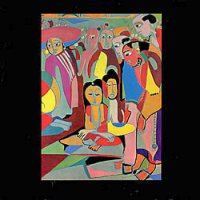 It shouldn't be necessary to inform you about whom of The Nice' ex-members that got the most successful career after the disbanding of that group. However, both Lee Jackson and Brian Davison started their own bands, but without any noticeable success. Jackson formed Jackson Heights that were able to make as much as four albums. Davison's new group Every Which Way lasted on the other hand for only one record, and that's really not much to be sad about if the music on this album was the best they had to offer. Musically it reminds me of a jazzier and more progressive version of Gordon Haskell's "It Is and It Isn't" album, but without the good melodies. Most of the songs are stretched out by lots of tedious soloing on saxophone from Geoffrey Peach, and Graham Bell's vocal delivery sounds depressing, lacking dynamics and range. The pace of the album is slow and laid-back, rarely firing up much excitement or energy. "The Light" has got a quite good sax-riff that is used sparsely and intelligent, but unfortunately gets lost in the tedium of the rest of the song. The only track that I really care for here is "Castle Sand". This mellow and fine song has got Peach' flute floating gently around it, and the melody is one of the few memorable ones on the album. "Go Placidly" also has some good tendencies in the melodic department, but several boring aspects about it too. You should rather check out Refugee's album from 1974 instead if you want the best thing that Davison were involved in after The Nice. It shouldn't be necessary to inform you about whom of The Nice' ex-members that got the most successful career after the disbanding of that group. However, both Lee Jackson and Brian Davison started their own bands, but without any noticeable success. Jackson formed Jackson Heights that were able to make as much as four albums. Davison's new group Every Which Way lasted on the other hand for only one record, and that's really not much to be sad about if the music on this album was the best they had to offer. Musically it reminds me of a jazzier and more progressive version of Gordon Haskell's "It Is and It Isn't" album, but without the good melodies. Most of the songs are stretched out by lots of tedious soloing on saxophone from Geoffrey Peach, and Graham Bell's vocal delivery sounds depressing, lacking dynamics and range. The pace of the album is slow and laid-back, rarely firing up much excitement or energy. "The Light" has got a quite good sax-riff that is used sparsely and intelligent, but unfortunately gets lost in the tedium of the rest of the song. The only track that I really care for here is "Castle Sand". This mellow and fine song has got Peach' flute floating gently around it, and the melody is one of the few memorable ones on the album. "Go Placidly" also has some good tendencies in the melodic department, but several boring aspects about it too. You should rather check out Refugee's album from 1974 instead if you want the best thing that Davison were involved in after The Nice.
De De Lind - "Io Non So Da Dove Vengo E Non So Dove Mai Andro'. Uomo E' Il Nome Che Mi Han Dato" (Mercury 1973)
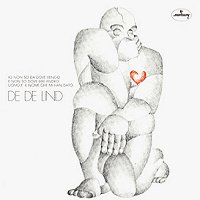 Flute-driven heavy progressive band from, as you may guess, Italy. Well, to call this "heavy-progressive" is only partly right because they also use much time on quiet, acoustic parts with some very beautiful and atmospheric flute and the usual emotional Italian vocals. The album is probably a concept-album as many of the same themes and riffs are repeated through the whole album. There's not a single track here that stands out from the others, instead the album works best as a whole and has a very fine and continuous flow. As with all other flute-driven progressive rock bands, it's almost impossible to not be reminded of Jethro Tull when listening to this, but the album still have the unique Italian touch to it just like most other progressive rock albums of the 70's from that country. There's a good balance between the heavy parts and the quiet acoustic ones. The flute usually plays the riffs along with the guitar in the heavy parts, while it wanders more of it's own in the quiet parts and often evolving into very beautiful melodies where the rest of the band soon joins in. Excellent stuff and recommended for anyone into flute-dominated prog and Italian progressive rock. Flute-driven heavy progressive band from, as you may guess, Italy. Well, to call this "heavy-progressive" is only partly right because they also use much time on quiet, acoustic parts with some very beautiful and atmospheric flute and the usual emotional Italian vocals. The album is probably a concept-album as many of the same themes and riffs are repeated through the whole album. There's not a single track here that stands out from the others, instead the album works best as a whole and has a very fine and continuous flow. As with all other flute-driven progressive rock bands, it's almost impossible to not be reminded of Jethro Tull when listening to this, but the album still have the unique Italian touch to it just like most other progressive rock albums of the 70's from that country. There's a good balance between the heavy parts and the quiet acoustic ones. The flute usually plays the riffs along with the guitar in the heavy parts, while it wanders more of it's own in the quiet parts and often evolving into very beautiful melodies where the rest of the band soon joins in. Excellent stuff and recommended for anyone into flute-dominated prog and Italian progressive rock.
Deep Feeling - "Deep Feeling" (DJM 1971)
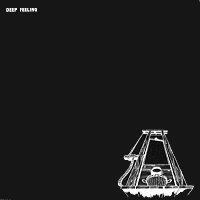 1971 was perhaps the best year for the lesser known British bands who still found themselves in the proto-prog category. Such acclaimed albums as Cressida's "Asylum", Beggar's Opera's "Waters of Change" and of course Spring's self-titled album were released that year. But while these albums are well known to at least progressive rock fans, Deep Feeling's album from the same year seems to be strangely forgotten, even if it occasionally boasted a higher degree of complexity than the earlier mentioned bands. Opener "Welcome for a Soldier" reminds quite a lot of Fruupp, even if this was two years before that band's debut. It features a nice and thoughtful verse, catchy chorus and a somewhat experimental chorale part in the middle, everything wrapped up in the typical early '70s progressive rock arrangements (although the Mellotron was not among the equipment of keyboardist Derek Elsen). The depressing and even gory lyrics are however not quite my thing, but I always keep more attention to the music anyway. The next tune "Old People's Home" is a sentimental and lightweight little acoustic song with some nice and folksy vocal harmonies. But the band returns to full progressive form again in their impressive version of "Classical Gas". Many of you will know this superb instrumental piece as the highlight from Beggar's Opera's otherwise forgettable "Get Your Dog off Me!" album released a few years later. But while Beggar's Opera's version was a fast, almost pop-inflected catchy ditty, Deep Feeling's version went for a far more epic progressive approach with an almost medieval feel in the complex arrangements. The harpsichord is one of the main instruments here, and it plays superbly along with Mart Jenner's guitar. Some obligatory classical influenced organ also appears at the end. The dark and gory lyrics return again in the band's own "Guillotine" that perhaps is the most complex song here. The lengthy instrumental section is a bit harder and more aggressive than the rest of the record, and the complexity equals even Marsupilami. The album sadly seems to miss its progressive focus from then on, first with the uninteresting and country-ish "Country Heir" that sounds like a completely different and FAR less interesting band. A short flute part at first fools you into believing that they are about to redeem the track, but it's unfortunately cut off almost in the same moment as it starts. A cover of Little Richard's "Lucille" seems at first to be even more out of place on the album, but it's actually musically better than "Country Heir" as they managed to update and transform the song into a decent '70s rocker. It sounds quite a lot like the more straightforward moments of the many brass-rock bands that were around at the same time, but strangely enough without any brass! So, those two last tracks make the album a little uneven, at least from a progressive point of view. But you shouldn't let that put you off, as 3/4 of the album still features some very worthwhile music that will suit you well if you're a fan of British proto-prog. 1971 was perhaps the best year for the lesser known British bands who still found themselves in the proto-prog category. Such acclaimed albums as Cressida's "Asylum", Beggar's Opera's "Waters of Change" and of course Spring's self-titled album were released that year. But while these albums are well known to at least progressive rock fans, Deep Feeling's album from the same year seems to be strangely forgotten, even if it occasionally boasted a higher degree of complexity than the earlier mentioned bands. Opener "Welcome for a Soldier" reminds quite a lot of Fruupp, even if this was two years before that band's debut. It features a nice and thoughtful verse, catchy chorus and a somewhat experimental chorale part in the middle, everything wrapped up in the typical early '70s progressive rock arrangements (although the Mellotron was not among the equipment of keyboardist Derek Elsen). The depressing and even gory lyrics are however not quite my thing, but I always keep more attention to the music anyway. The next tune "Old People's Home" is a sentimental and lightweight little acoustic song with some nice and folksy vocal harmonies. But the band returns to full progressive form again in their impressive version of "Classical Gas". Many of you will know this superb instrumental piece as the highlight from Beggar's Opera's otherwise forgettable "Get Your Dog off Me!" album released a few years later. But while Beggar's Opera's version was a fast, almost pop-inflected catchy ditty, Deep Feeling's version went for a far more epic progressive approach with an almost medieval feel in the complex arrangements. The harpsichord is one of the main instruments here, and it plays superbly along with Mart Jenner's guitar. Some obligatory classical influenced organ also appears at the end. The dark and gory lyrics return again in the band's own "Guillotine" that perhaps is the most complex song here. The lengthy instrumental section is a bit harder and more aggressive than the rest of the record, and the complexity equals even Marsupilami. The album sadly seems to miss its progressive focus from then on, first with the uninteresting and country-ish "Country Heir" that sounds like a completely different and FAR less interesting band. A short flute part at first fools you into believing that they are about to redeem the track, but it's unfortunately cut off almost in the same moment as it starts. A cover of Little Richard's "Lucille" seems at first to be even more out of place on the album, but it's actually musically better than "Country Heir" as they managed to update and transform the song into a decent '70s rocker. It sounds quite a lot like the more straightforward moments of the many brass-rock bands that were around at the same time, but strangely enough without any brass! So, those two last tracks make the album a little uneven, at least from a progressive point of view. But you shouldn't let that put you off, as 3/4 of the album still features some very worthwhile music that will suit you well if you're a fan of British proto-prog.
Dice - "Dice" (1978)
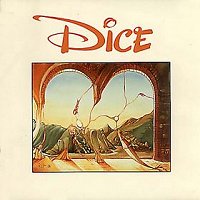 Swedish band with excellent instrumental skills, but their songwriting did unfortunately never get better than ok. Their sound seems sometimes to be quite Gentle Giant influenced. The arrangements are great with lots of mellotron, organ and tasteful sounding synths. But as I said, their songwriting is never something really outstanding. The best tracks here is probably the not so very serious "The Utopian Suntan" and the instrumental "The Venetian Bargain". The 22-minute "Follies" has its moments, but some parts are simply extremely boring. And the vocals are rather weak, with a strong accent. The best thing about this album is the cover, which mixes influences of Salvador Dali and Walt Disney! But if Dice had written better compositions, then they really could have been worth a recommendation. Swedish band with excellent instrumental skills, but their songwriting did unfortunately never get better than ok. Their sound seems sometimes to be quite Gentle Giant influenced. The arrangements are great with lots of mellotron, organ and tasteful sounding synths. But as I said, their songwriting is never something really outstanding. The best tracks here is probably the not so very serious "The Utopian Suntan" and the instrumental "The Venetian Bargain". The 22-minute "Follies" has its moments, but some parts are simply extremely boring. And the vocals are rather weak, with a strong accent. The best thing about this album is the cover, which mixes influences of Salvador Dali and Walt Disney! But if Dice had written better compositions, then they really could have been worth a recommendation.
Dr. Z - "Three Parts to My Soul" (Vertigo 1971)
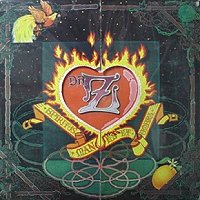 Dr. Z's first and only album is the most rare record released on the Vertigo-swirl label. It sold only about 70 copies (!!) when it was released, and the rest of the pressings were trashed. It's actually not so hard to understand, as the music on the album often was extremely clumsy and awkward. The band had three members who played harpsichord, bass and drums. The fact that harpsichord was the only keyboard used gave them at least a somewhat unique sound. The lyrics dealt with occultism and the evil of man, and were far better written than the music. And just like Black Widow's "Sacrifice" this gave the album a slight amusement-value to it. The opening track "Evil Woman's Manly Child" included the following cute lines: "Covet every man his wife/Cut love up with a knife/Salt the wound that's sore/Rub it where it cuts your mind in half/Set your fellow man against his friend/Torment him to the end". The mellow "In a Token of Despair" was easily the best track on the whole album, and told about the part of the soul that remains on the earth to haunt it forever. This is still an album for serious collectors only, not just because of the not so very good music, but you'll also have to pay a fortune if you ever find one of the 70 remaining copies of it. And that's not very likely at all. Dr. Z's first and only album is the most rare record released on the Vertigo-swirl label. It sold only about 70 copies (!!) when it was released, and the rest of the pressings were trashed. It's actually not so hard to understand, as the music on the album often was extremely clumsy and awkward. The band had three members who played harpsichord, bass and drums. The fact that harpsichord was the only keyboard used gave them at least a somewhat unique sound. The lyrics dealt with occultism and the evil of man, and were far better written than the music. And just like Black Widow's "Sacrifice" this gave the album a slight amusement-value to it. The opening track "Evil Woman's Manly Child" included the following cute lines: "Covet every man his wife/Cut love up with a knife/Salt the wound that's sore/Rub it where it cuts your mind in half/Set your fellow man against his friend/Torment him to the end". The mellow "In a Token of Despair" was easily the best track on the whole album, and told about the part of the soul that remains on the earth to haunt it forever. This is still an album for serious collectors only, not just because of the not so very good music, but you'll also have to pay a fortune if you ever find one of the 70 remaining copies of it. And that's not very likely at all.
Druid - "Toward the Sun" (EMI 1975)
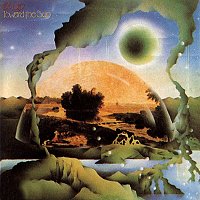 The roots of Druid goes back to 1970 and a trio who called themselves Maggot. They added a keyboard player to their sound and finally became Druid. The band had excellent instrumental skills and all the right moves for a symphonic progressive rock band: swirling Mellotron and organ, sweeping, tasty analogue synths, thundering Rickenbacker-bass and some of the highest falsetto-vocals ever heard from a progressive rock band. Their music often sounded like a softer and more folk-influenced version of Yes. The only problem was their songwriting, which was not more than decent and OK. But their nice, very accomplished and atmospheric sound made up for some of it. The best tracks on their debut "Toward the Sun" includes "Voices", the beautiful "Red Carpet for an Autumn" and the title-track. The latter was next to "Shangri-La" the best examples of their combination of Yes and folk-influences. "Theme" is an instrumental number that includes some Tangerine Dream-sounding Mellotron in the mid-part. The two remaining tracks, "Remembering" and "Dawn of Evening" features both lots of great, delightful arrangements and playing but the compositions themselves are rather mediocre and never really catch fire. Quite nice stuff, although there are better obscure progressive rock albums from the mid-70's. The roots of Druid goes back to 1970 and a trio who called themselves Maggot. They added a keyboard player to their sound and finally became Druid. The band had excellent instrumental skills and all the right moves for a symphonic progressive rock band: swirling Mellotron and organ, sweeping, tasty analogue synths, thundering Rickenbacker-bass and some of the highest falsetto-vocals ever heard from a progressive rock band. Their music often sounded like a softer and more folk-influenced version of Yes. The only problem was their songwriting, which was not more than decent and OK. But their nice, very accomplished and atmospheric sound made up for some of it. The best tracks on their debut "Toward the Sun" includes "Voices", the beautiful "Red Carpet for an Autumn" and the title-track. The latter was next to "Shangri-La" the best examples of their combination of Yes and folk-influences. "Theme" is an instrumental number that includes some Tangerine Dream-sounding Mellotron in the mid-part. The two remaining tracks, "Remembering" and "Dawn of Evening" features both lots of great, delightful arrangements and playing but the compositions themselves are rather mediocre and never really catch fire. Quite nice stuff, although there are better obscure progressive rock albums from the mid-70's.
Druid - "Fluid Druid" (EMI 1976)
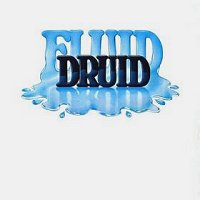 Their second and last album opens with the weakest track they ever recorded ("Razor Truth") but personally I think the songwriting on the rest of the album is a tad better and more varied than on their first. There's less Mellotron and falsetto-vocals in the arrangements this time, but they managed to keep the warmth and atmosphere in their sound. The best tracks are "Painter's Cloud", "Crusade" and "Nothing but Morning". Personally I think the melodies and instrumental parts in these tracks surpass anything on their debut. "Kestrel" is one of the most complex tracks they recorded, even if it's less than 4 minutes long. "Left to Find" reminds me a lot of Fruupp, both in the arrangement and build-up. "Barnaby" is a quite funny surprise with its ska/funk-influences and differs completely from everything else they did. Too bad that they didn't record any more after "Fluid Druid" as it shows maturing songwriting from the band, and a third album would probably been even better if everything had gone the right way. Their second and last album opens with the weakest track they ever recorded ("Razor Truth") but personally I think the songwriting on the rest of the album is a tad better and more varied than on their first. There's less Mellotron and falsetto-vocals in the arrangements this time, but they managed to keep the warmth and atmosphere in their sound. The best tracks are "Painter's Cloud", "Crusade" and "Nothing but Morning". Personally I think the melodies and instrumental parts in these tracks surpass anything on their debut. "Kestrel" is one of the most complex tracks they recorded, even if it's less than 4 minutes long. "Left to Find" reminds me a lot of Fruupp, both in the arrangement and build-up. "Barnaby" is a quite funny surprise with its ska/funk-influences and differs completely from everything else they did. Too bad that they didn't record any more after "Fluid Druid" as it shows maturing songwriting from the band, and a third album would probably been even better if everything had gone the right way.
Label

|